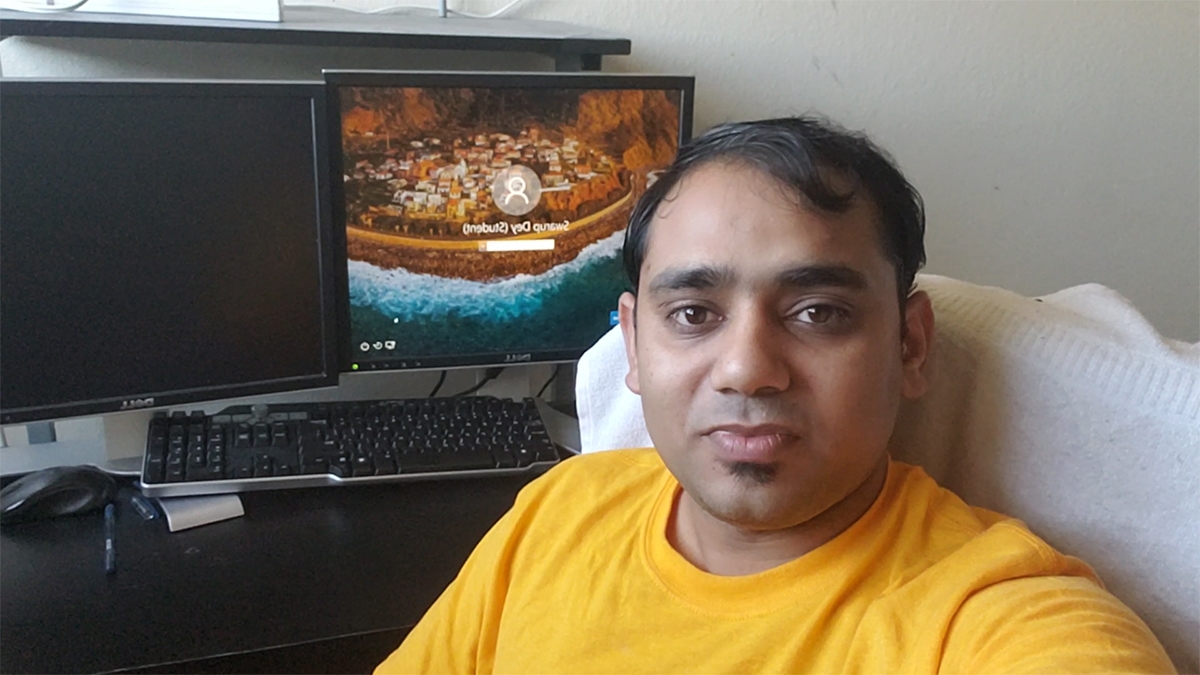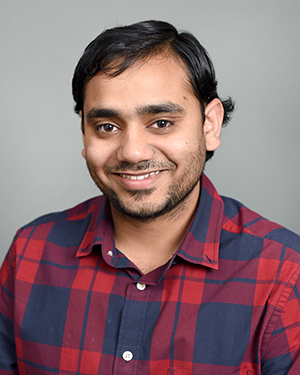ASU student receives 2020 School of Molecular Sciences Innovation Award for medical device

School of Molecular Sciences graduate student Swarup Dey was recently awarded the school's 2020 Innovation Award.
Arizona State University graduate student Swarup Dey has been awarded the 2020 School of Molecular Sciences Innovation Award for his invention, which creates a DNA nanosensor that mimics transmembrane proteins.
“Since I began my journey in research, it has always been my dream to work on something that will leave an impact on the world," Dey said.
Established in 2019, the School of Molecular Sciences Innovation Award recognizes a graduate student, or student team, for achieving the school's mission of discovering molecular-level solutions to real-world challenges through the pursuit of methodology, or the development of a research idea or invention. The annual award rotates through one of the six primary research areas of the school, and the 2020 research areas were biological molecular science, and disease and diagnosis.
Dey joined the school's PhD Program in fall 2015 after earning a master's degree in chemistry from the Indian Institute of Technology Bombay. His research focuses on “developing a cheaper and faster method for blood test-based cancer detection in the early stage of the disease.” He works under the supervision of professors Hao Yan and Rizal Hariadi.
“The theme of the 2020 SMS Innovation Award resonated with my research theme. I am grateful to be selected for this award,” Dey said.
Professors Hariadi and Yan said: “Swarup has conceived and executed a very innovative and original idea for rapid, cheap, liquid biopsy-based cancer diagnostics. Swarup Dey‘s invention will have a potential impact on helping doctors by providing rapid, ultrasensitive, highly specific and cost-effective diagnosis and prognosis of cancer patients without the need for surgical tissue biopsy.”
Swarup has already been granted a patent for his innovation. He is also preparing a manuscript on the research to be submitted to a primary research journal, and the work will be part of his PhD dissertation.
“I am delighted by the selection of Swarup Dey as the recipient of the 2020 SMS Innovation Award," said Bill Glaunsinger, School of Molecular Sciences emeritus professor, former unit chair and founder of the Innovation Award. "He has created a novel DNA nanosensor that mimics transmembrane proteins. This invention has the potential to provide a minimally invasive method for the early detection of cancer which is rapid, sensitive, specific and cost effective. Hopefully this prestigious award will help encourage Swarup to continue to pursue his invention.”
Here, Dey talks more about his project:

Swarup Dey
Question: What’s your vision about this innovation project?
Answer: This project has helped to inch a little bit toward changing the world and creating something to make diagnosis easier. I am really grateful to be selected for this award.
Q: How did you process this project?
A: I had this idea since summer of 2016. Initially we worked on it for about a year but it was too difficult and did not work. In the summer of 2019, we changed our design and thought to give it another shot. This time it worked. This has matured me as a researcher to understand the complexity and beauty of biology and never give up.
Q: What’s the next step of your innovation?
A: In the first part of our innovation we were trying to mimic the function of a class of biological protein that plays a crucial role in our body – from visualizing to controlling our blood pressure to let us think. Next, we used this feature to develop a rapid, diagnostic method for detection of cancer in early stages without the need of expensive and painful surgical biopsy processes.
The next step of this research involves optimizing our system for use in a clinical set up so that it can be commercialized. If successfully translated to the market, our innovation has the ability to improve current cancer diagnosis methods by a) reducing cost b) making it less painful — just a simple blood or urine test would be enough c) early stage detection with more time for doctors to save patients.
Being from an economically strained region in India, where health care is not very easily accessible, my dream is to develop a cheap health care solution for people who cannot afford expensive tests.
Q: Which faculty member helped you with your innovation?
A: Being part of Professor Hao Yan’s research group, surrounded by the highly collaborative environment of the Center for Molecular Design and Biomimetics in the Biodesign Institute, has helped me tremendously. Professor Yan always encourages independent thinking and pursuit of passion rather than following a set of standard rules. This has really helped me grow as an independent thinker under his guidance.
I must also mention my other advisers — Dr. Rizal Hariadi and Dr. Yan Liu whose continuous support and ideas have helped me explore various fronts in this project. Dr. Hariadi always strives for work that alleviates real world problems. I consider myself to be lucky to be guided by these seasoned scientists in a world class institute.
Written by Mariela Lozano, communications assistant, School of Molecular Sciences
More Science and technology

Science meets play: ASU researcher makes developmental science hands-on for families
On a Friday morning at the Edna Vihel Arts Center in Tempe, toddlers dip paint brushes into bright colors, decorating paper…

ASU water polo player defends the goal — and our data
Marie Rudasics is the last line of defense.Six players advance across the pool with a single objective in mind: making sure that…

Diagnosing data corruption
You are in your doctor’s office for your annual physical and you notice the change. This year, your doctor no longer has your…

